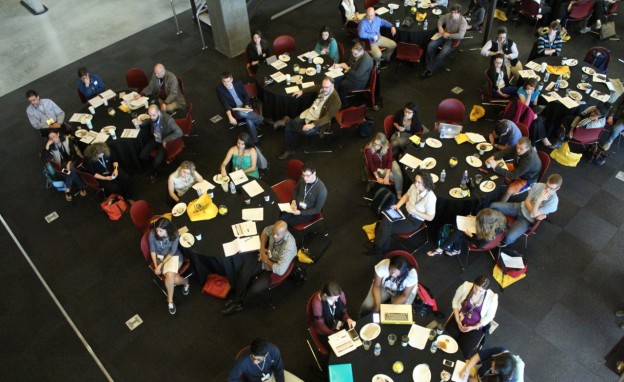PBS MediaShift produced its second annual Journalism School Hackathon in conjunction with the Walter Cronkite School of Journalism and Mass Communication at Arizona State University in Phoenix at the end of February. Top students, faculty and professionals gathered with a specific aim for this year: to create sustainable media projects that reach underserved populations.
They were tasked with creating media projects in one of three threads: data, gaming or audience engagement.
We’ve rounded up a collection of photos, video, coverage and a Storify to take you back to the hackathon and spotlight some of the ideas that came out. Did we miss anything? Please add it in the comments, and we’ll update the post.
Photos
Video
Watch the team’s pitches at the end of the Hackathon:
PBS Mediashift 2nd Annual Hackathon Team Pitches from Cronkite School on Vimeo.
Winners announcement:
PBS Mediashift 2nd Annual Hackathon Winners Announcement from Cronkite School on Vimeo.
Coverage
PBS MediaShift Journalism School Hackathon Encourages Entrepreneurship, by Lia Juriansz, PBS MediaShift
My Experience in Developing ‘El Remedio’ at the J-School Hackathon, by Alex Arriaga, PBS MediaShift
How the J-School Hackathon Turned Me Into an Entrepreneur, by Tresa Tudrick, PBS MediaShift
Lessons Learned from the Journalism School Hackathon, by Hannah Wang, PBS Idea Lab
PBS MediaShift hackathon aims to deliver news to underserved communities, by Raisa Habersham, All Digitocracy
Journalism School Hackathon at Arizona State Information Page, at PBS MediaShift
Feedback & Ideas
Here are some testimonials and feedback from our surveys of participants:
“Wow! My students and I had such a fantastic time. I figured that the Hackathon would be a fun and challenging learning experience, but I blown away with such great takeaways from the speakers and being so inspired by the students’/teams’ ideas. Our team did well, but even before the judges’ feedback was announced, I was already convinced that the Hackathon was one of the best journalism conferences/events/training that I’ve ever participated in, and I am going to encourage our students to attend in the future.”
— Danielle Cervantes Point Loma Nazarene University Journalism Adjunct
“Super event from start to finish. Great to work with such smart, motivated people. The speakers were wonderful and set up the next phases of the hackathon nicely.” — Mike Reilley, ASU Cronkite School
“The hackathon taught me so much about the importance of entrepreneurship in journalism. I never knew it could and should be a part of my education. The weekend provided me an unforgettable and exhilarating experience. I haven’t been so inspired in a long, long time.” — Ryan Stanley, American University
“I think the idea for reaching underserved audiences was very problematic. It didn’t really make sense for people to have to speak for others outside their race or background and it also seemed to make many people uncomfortable when people drew communities out of hats. There were definitely a few cringe-worthy moments during the presentations that I think may have been ameliorated by a different topic. That doesn’t mean people should not speak about race — I think it’s essential that we consider these issues as journalists and human beings. But to ask people to represent a race as the focus of the project isn’t the best way to consider these issues.” – Nitesh Gupta, Tufts University
Here are some ideas for future Hackathons:
“I think there needs to be more closure on the event. For many of the teams not receiving an honorable mention or better, they worked very hard and received no feedback. They will have left not knowing what they did well or what they could have done better. One suggestion might be to assign a judge to a team and have them debrief the students as a closure activity.”
“It felt like a start-up bootcamp. Not enough connection to journalism.”
“I suggest trying to organize the event around a more precisely defined theme, e.g. helping people in poverty, or in rural areas, or focusing on a topic such as the electoral process or the environment. Then provide some background as a way of kicking off the weekend. This would help to avoid the problem that some teams faced in trying to speak for communities that were not well represented at the event.”
“Facilitators draft teams on-site based on student team skills/experience. One student facilitator per team (past hackathon participant). Lightning pitch session on Saturday at dinner. 30 seconds on idea, gain quick feedback, identify areas to improve.”

